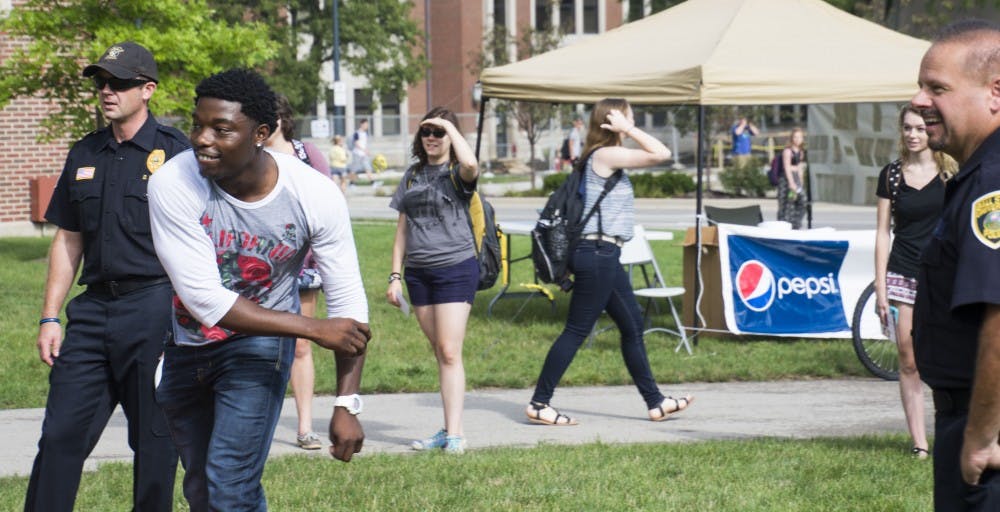The late 1990s saw a marked increase in the number of dedicated community policing officers specifically tasked with building relationships in their assigned neighborhoods, according to a Justice Department survey. In 1997, 34 percent of all departments used such officers, while by 2000, the number had jumped to 66 percent.
The University Police Department is redefining what law enforcement is at Ball State through community policing.
"It's going into the residence halls, being in a dining facility...," UPD Chief James Duckham said. "It's where people would be comfortable getting to know the police officers in a nontraditional way.”
Community policing is a philosophy, according to U.S. Department of Justice. It builds partnerships between officers and the community they serve, encouraging a greater trust in police and better problem solving in neighborhoods.
For Duckham, community policing is more than just a philosophy. It’s a passion, and one that he has been working toward since he came to Ball State in 2014 under former Chief Gene Burton.
“I came here with that concept of what I wanted to do,” Duckham said. “I just think it's so important, especially today."
Duckham wants to see police and students form a receptive community by engaging with one another.
In a presentation at the Board of Trustees Meeting on Sept. 9, Duckham reinforced the concept of community policing and described the initiative as a "department-wide approach to intentional partnership development geared at problem solving, increasing meaningful engagement, service-oriented, compressive training and evaluating performance."
This is something that starts at the top, Duckham said.
“Community policing starts at the top and works all the way down to the recruiting officers,” Duckham said. “It’s a philosophy of engagement, service, getting to know the community and doing a lot of outreach in their spaces in a sense of not bringing them to the police department per se or not just going to historical places were you would expect cops to be."
One common misconception the Duckham sees within other police departments is that they think community policing is just about placing one officer in an area or participating in one specific program.
“I cringe when I hear that because that's not community policing,” Duckham told the Daily News in a past interview.
“I struggle with departments that have a particular program, and they think that’s community policing, so we have a lot of programs: Lunch with a Cop, flyer program to prevent burglary, the officer liaison program. … Those are great programs, but within themselves, [they are] not community policing,” Duckham said.
RELATED: Lunch with a Cop program aims to better public perspective toward police
Community policing is a constant commitment.
“It's labor insensitive,” Duckham said. “When you think about Lunch with a Cop, that’s an hour plus that an officer is engaged in that particular activity. So, there's a commitment of resources, but, from my perspective — and I think a lot of chiefs feel this way — it's just so important to do that. You need to commit these resources today.”
The goal this year with community policing is to continue to interact with students but with a multicultural approach in partnership with multiple organizations on campus, like the Multicultural Center.
“I think it's dealing with organizations and groups that have historically may not have had the greatest relationships with police departments,” Duckham said.
A 2014 Pew Research poll found that while most Americans hold a generally favorable view of their local police, blacks and Latinos have much less faith in their police forces than white Americans do.
Bridging the gap by reaching out to minority groups is a key part of community policing.
“I have spoken with the Spectrum executive board, students of color who may have come from communities where ... they weren’t comfortable with the police departments,” Duckham said. “My goal, quite frankly, is for people to see how it works on campus and go home and expect it from the communities where they live and have those positive relationships that we have developed here go to where they live. For them to be saying to their friends, ‘Well, I’m pretty comfortable with the cops.' I am hopeful that is what is going to happen.”
University Police Department members participate in training on topics like cultural diversity, bias incidents, hate crimes and racial profiling in relations to the multicultural approach because “it’s important that police understand the community’s concerns and perspective on important topics, such as race relations."
While UPD has already seen successful rates in student interaction, as more than 170 students have participated in Lunch with a Cop this semester, Duckham encourages students and organizations on campus to continue reach out to the department.
“I just keep telling people to invite us to the fun stuff,” Duckham said. “I know we go and do the drug and alcohol stuff and beer goggles in the resident halls and the alcohol awareness week, but it's really cool to go to stuff where they make cookies or doing something that is not a traditional police type of thing. I think those are the way people really get to see us outside out the uniform."
Duckham brought up students reaching out to him and the department to be present at the Anti-Trump demonstration on Nov. 9. He said, though student might not realize it, this is a form of community policing.
“When student’s leaders that are running those events call us and say ‘Hey we would like you and UPD to be at the event,’ I think that really sends a message that we are accomplishing that goal of getting to our campus community, and our campus community is comfortable with us,” he said. “We don’t want to be seen as just the police department, we want be seen as a part of the campus community.”





